Developing Entreprising Individual
VerifiedAdded on 2022/08/17
|13
|3447
|11
AI Summary
Contribute Materials
Your contribution can guide someone’s learning journey. Share your
documents today.
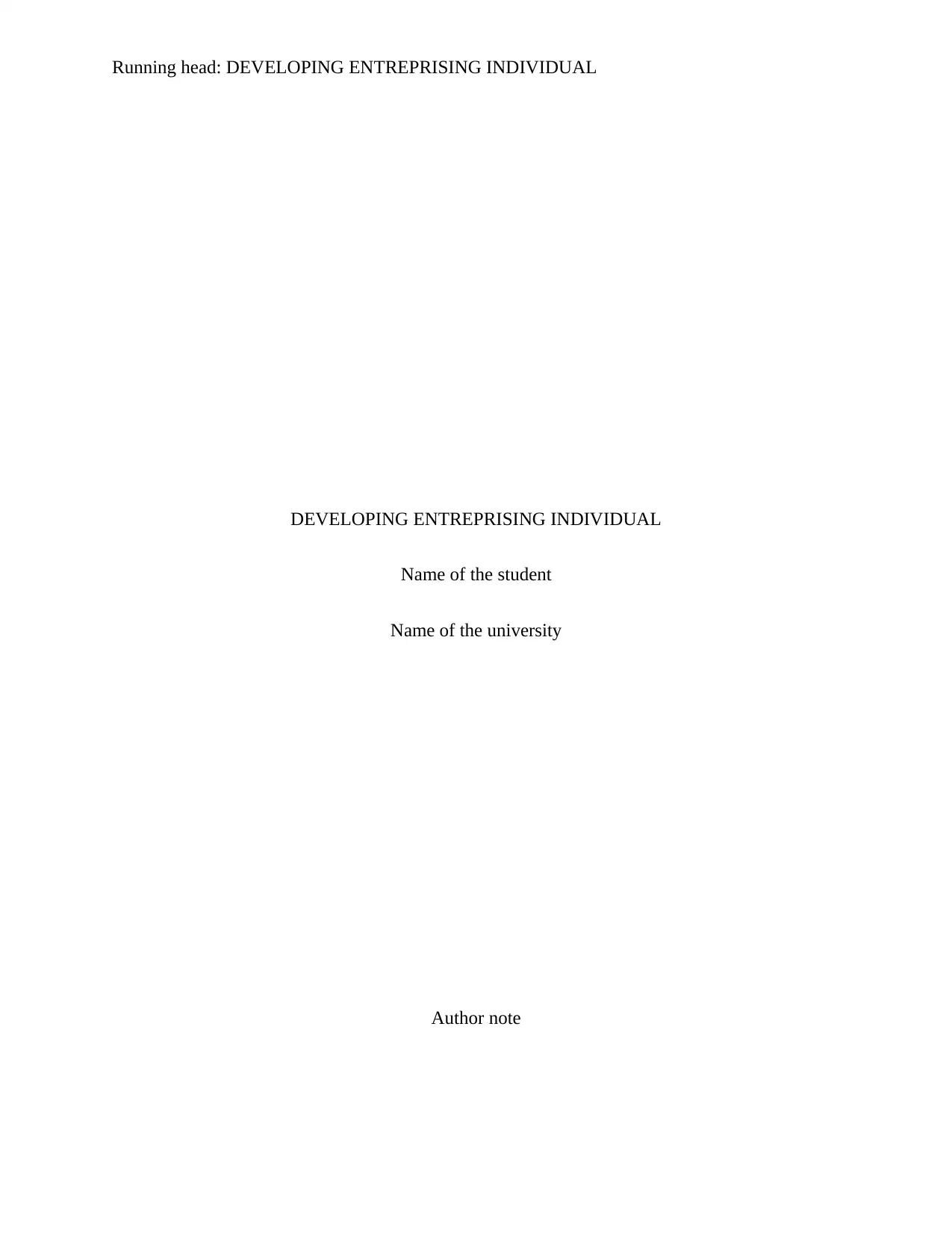
Running head: DEVELOPING ENTREPRISING INDIVIDUAL
DEVELOPING ENTREPRISING INDIVIDUAL
Name of the student
Name of the university
Author note
DEVELOPING ENTREPRISING INDIVIDUAL
Name of the student
Name of the university
Author note
Secure Best Marks with AI Grader
Need help grading? Try our AI Grader for instant feedback on your assignments.
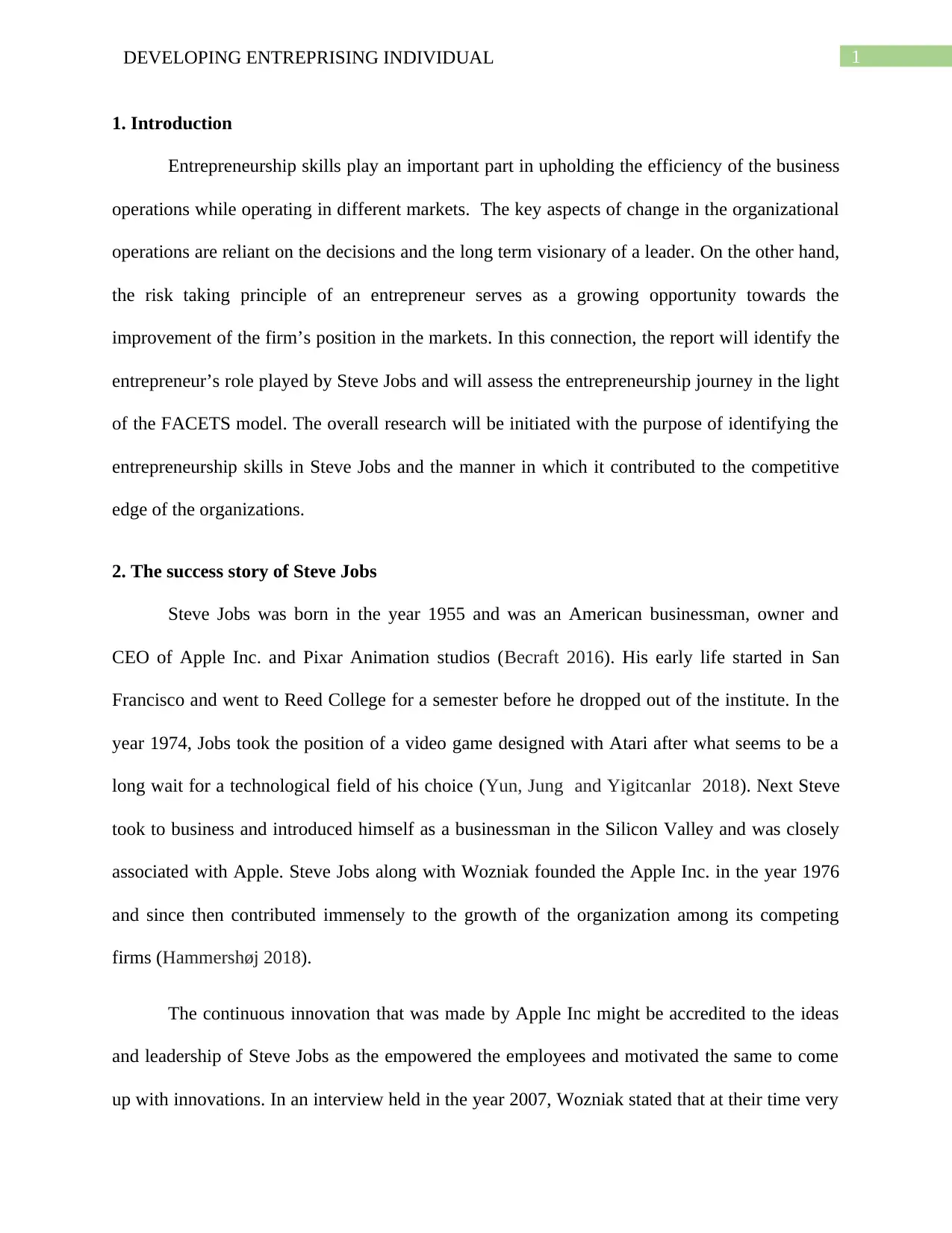
1DEVELOPING ENTREPRISING INDIVIDUAL
1. Introduction
Entrepreneurship skills play an important part in upholding the efficiency of the business
operations while operating in different markets. The key aspects of change in the organizational
operations are reliant on the decisions and the long term visionary of a leader. On the other hand,
the risk taking principle of an entrepreneur serves as a growing opportunity towards the
improvement of the firm’s position in the markets. In this connection, the report will identify the
entrepreneur’s role played by Steve Jobs and will assess the entrepreneurship journey in the light
of the FACETS model. The overall research will be initiated with the purpose of identifying the
entrepreneurship skills in Steve Jobs and the manner in which it contributed to the competitive
edge of the organizations.
2. The success story of Steve Jobs
Steve Jobs was born in the year 1955 and was an American businessman, owner and
CEO of Apple Inc. and Pixar Animation studios (Becraft 2016). His early life started in San
Francisco and went to Reed College for a semester before he dropped out of the institute. In the
year 1974, Jobs took the position of a video game designed with Atari after what seems to be a
long wait for a technological field of his choice (Yun, Jung and Yigitcanlar 2018). Next Steve
took to business and introduced himself as a businessman in the Silicon Valley and was closely
associated with Apple. Steve Jobs along with Wozniak founded the Apple Inc. in the year 1976
and since then contributed immensely to the growth of the organization among its competing
firms (Hammershøj 2018).
The continuous innovation that was made by Apple Inc might be accredited to the ideas
and leadership of Steve Jobs as the empowered the employees and motivated the same to come
up with innovations. In an interview held in the year 2007, Wozniak stated that at their time very
1. Introduction
Entrepreneurship skills play an important part in upholding the efficiency of the business
operations while operating in different markets. The key aspects of change in the organizational
operations are reliant on the decisions and the long term visionary of a leader. On the other hand,
the risk taking principle of an entrepreneur serves as a growing opportunity towards the
improvement of the firm’s position in the markets. In this connection, the report will identify the
entrepreneur’s role played by Steve Jobs and will assess the entrepreneurship journey in the light
of the FACETS model. The overall research will be initiated with the purpose of identifying the
entrepreneurship skills in Steve Jobs and the manner in which it contributed to the competitive
edge of the organizations.
2. The success story of Steve Jobs
Steve Jobs was born in the year 1955 and was an American businessman, owner and
CEO of Apple Inc. and Pixar Animation studios (Becraft 2016). His early life started in San
Francisco and went to Reed College for a semester before he dropped out of the institute. In the
year 1974, Jobs took the position of a video game designed with Atari after what seems to be a
long wait for a technological field of his choice (Yun, Jung and Yigitcanlar 2018). Next Steve
took to business and introduced himself as a businessman in the Silicon Valley and was closely
associated with Apple. Steve Jobs along with Wozniak founded the Apple Inc. in the year 1976
and since then contributed immensely to the growth of the organization among its competing
firms (Hammershøj 2018).
The continuous innovation that was made by Apple Inc might be accredited to the ideas
and leadership of Steve Jobs as the empowered the employees and motivated the same to come
up with innovations. In an interview held in the year 2007, Wozniak stated that at their time very
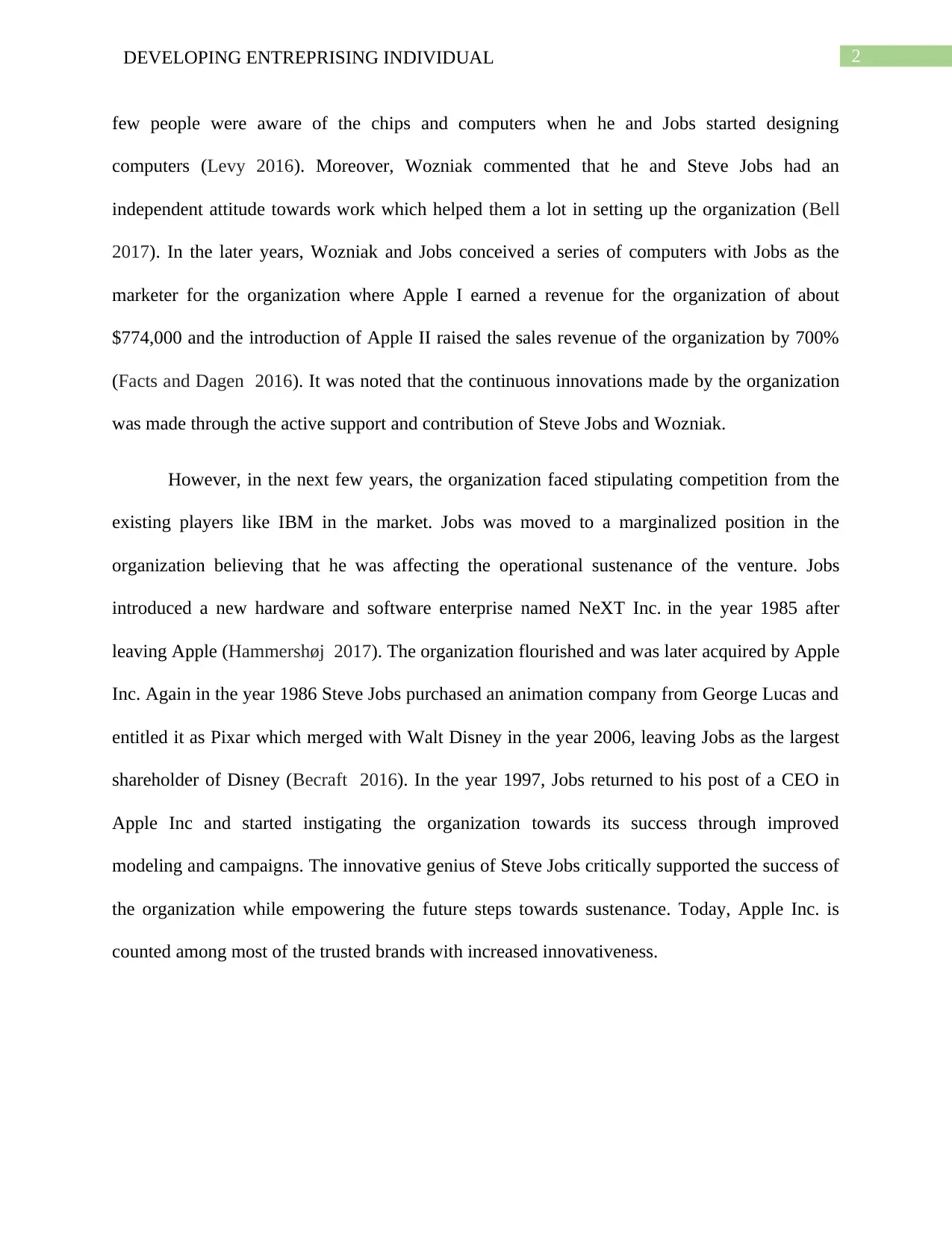
2DEVELOPING ENTREPRISING INDIVIDUAL
few people were aware of the chips and computers when he and Jobs started designing
computers (Levy 2016). Moreover, Wozniak commented that he and Steve Jobs had an
independent attitude towards work which helped them a lot in setting up the organization (Bell
2017). In the later years, Wozniak and Jobs conceived a series of computers with Jobs as the
marketer for the organization where Apple I earned a revenue for the organization of about
$774,000 and the introduction of Apple II raised the sales revenue of the organization by 700%
(Facts and Dagen 2016). It was noted that the continuous innovations made by the organization
was made through the active support and contribution of Steve Jobs and Wozniak.
However, in the next few years, the organization faced stipulating competition from the
existing players like IBM in the market. Jobs was moved to a marginalized position in the
organization believing that he was affecting the operational sustenance of the venture. Jobs
introduced a new hardware and software enterprise named NeXT Inc. in the year 1985 after
leaving Apple (Hammershøj 2017). The organization flourished and was later acquired by Apple
Inc. Again in the year 1986 Steve Jobs purchased an animation company from George Lucas and
entitled it as Pixar which merged with Walt Disney in the year 2006, leaving Jobs as the largest
shareholder of Disney (Becraft 2016). In the year 1997, Jobs returned to his post of a CEO in
Apple Inc and started instigating the organization towards its success through improved
modeling and campaigns. The innovative genius of Steve Jobs critically supported the success of
the organization while empowering the future steps towards sustenance. Today, Apple Inc. is
counted among most of the trusted brands with increased innovativeness.
few people were aware of the chips and computers when he and Jobs started designing
computers (Levy 2016). Moreover, Wozniak commented that he and Steve Jobs had an
independent attitude towards work which helped them a lot in setting up the organization (Bell
2017). In the later years, Wozniak and Jobs conceived a series of computers with Jobs as the
marketer for the organization where Apple I earned a revenue for the organization of about
$774,000 and the introduction of Apple II raised the sales revenue of the organization by 700%
(Facts and Dagen 2016). It was noted that the continuous innovations made by the organization
was made through the active support and contribution of Steve Jobs and Wozniak.
However, in the next few years, the organization faced stipulating competition from the
existing players like IBM in the market. Jobs was moved to a marginalized position in the
organization believing that he was affecting the operational sustenance of the venture. Jobs
introduced a new hardware and software enterprise named NeXT Inc. in the year 1985 after
leaving Apple (Hammershøj 2017). The organization flourished and was later acquired by Apple
Inc. Again in the year 1986 Steve Jobs purchased an animation company from George Lucas and
entitled it as Pixar which merged with Walt Disney in the year 2006, leaving Jobs as the largest
shareholder of Disney (Becraft 2016). In the year 1997, Jobs returned to his post of a CEO in
Apple Inc and started instigating the organization towards its success through improved
modeling and campaigns. The innovative genius of Steve Jobs critically supported the success of
the organization while empowering the future steps towards sustenance. Today, Apple Inc. is
counted among most of the trusted brands with increased innovativeness.
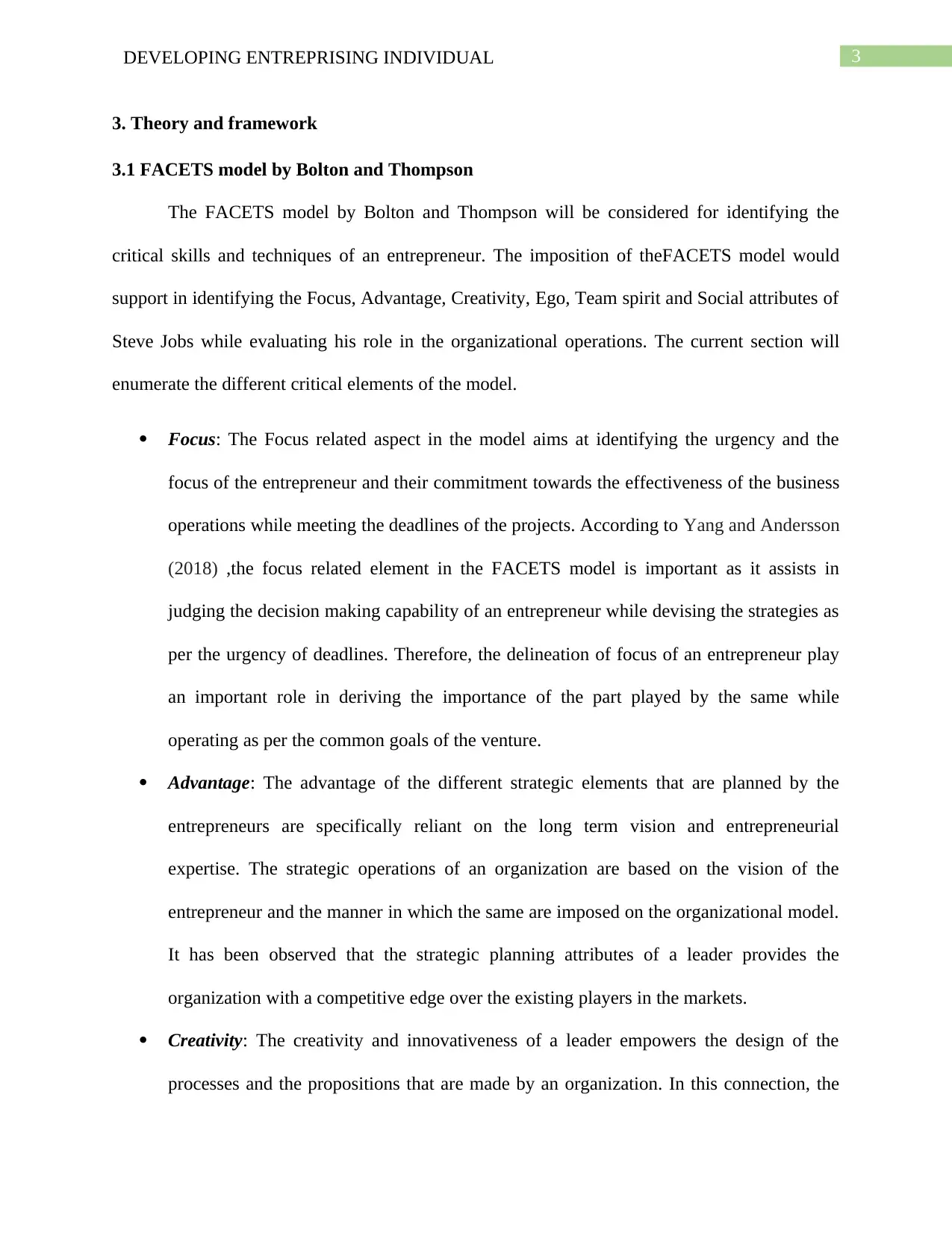
3DEVELOPING ENTREPRISING INDIVIDUAL
3. Theory and framework
3.1 FACETS model by Bolton and Thompson
The FACETS model by Bolton and Thompson will be considered for identifying the
critical skills and techniques of an entrepreneur. The imposition of theFACETS model would
support in identifying the Focus, Advantage, Creativity, Ego, Team spirit and Social attributes of
Steve Jobs while evaluating his role in the organizational operations. The current section will
enumerate the different critical elements of the model.
Focus: The Focus related aspect in the model aims at identifying the urgency and the
focus of the entrepreneur and their commitment towards the effectiveness of the business
operations while meeting the deadlines of the projects. According to Yang and Andersson
(2018) ,the focus related element in the FACETS model is important as it assists in
judging the decision making capability of an entrepreneur while devising the strategies as
per the urgency of deadlines. Therefore, the delineation of focus of an entrepreneur play
an important role in deriving the importance of the part played by the same while
operating as per the common goals of the venture.
Advantage: The advantage of the different strategic elements that are planned by the
entrepreneurs are specifically reliant on the long term vision and entrepreneurial
expertise. The strategic operations of an organization are based on the vision of the
entrepreneur and the manner in which the same are imposed on the organizational model.
It has been observed that the strategic planning attributes of a leader provides the
organization with a competitive edge over the existing players in the markets.
Creativity: The creativity and innovativeness of a leader empowers the design of the
processes and the propositions that are made by an organization. In this connection, the
3. Theory and framework
3.1 FACETS model by Bolton and Thompson
The FACETS model by Bolton and Thompson will be considered for identifying the
critical skills and techniques of an entrepreneur. The imposition of theFACETS model would
support in identifying the Focus, Advantage, Creativity, Ego, Team spirit and Social attributes of
Steve Jobs while evaluating his role in the organizational operations. The current section will
enumerate the different critical elements of the model.
Focus: The Focus related aspect in the model aims at identifying the urgency and the
focus of the entrepreneur and their commitment towards the effectiveness of the business
operations while meeting the deadlines of the projects. According to Yang and Andersson
(2018) ,the focus related element in the FACETS model is important as it assists in
judging the decision making capability of an entrepreneur while devising the strategies as
per the urgency of deadlines. Therefore, the delineation of focus of an entrepreneur play
an important role in deriving the importance of the part played by the same while
operating as per the common goals of the venture.
Advantage: The advantage of the different strategic elements that are planned by the
entrepreneurs are specifically reliant on the long term vision and entrepreneurial
expertise. The strategic operations of an organization are based on the vision of the
entrepreneur and the manner in which the same are imposed on the organizational model.
It has been observed that the strategic planning attributes of a leader provides the
organization with a competitive edge over the existing players in the markets.
Creativity: The creativity and innovativeness of a leader empowers the design of the
processes and the propositions that are made by an organization. In this connection, the
Secure Best Marks with AI Grader
Need help grading? Try our AI Grader for instant feedback on your assignments.
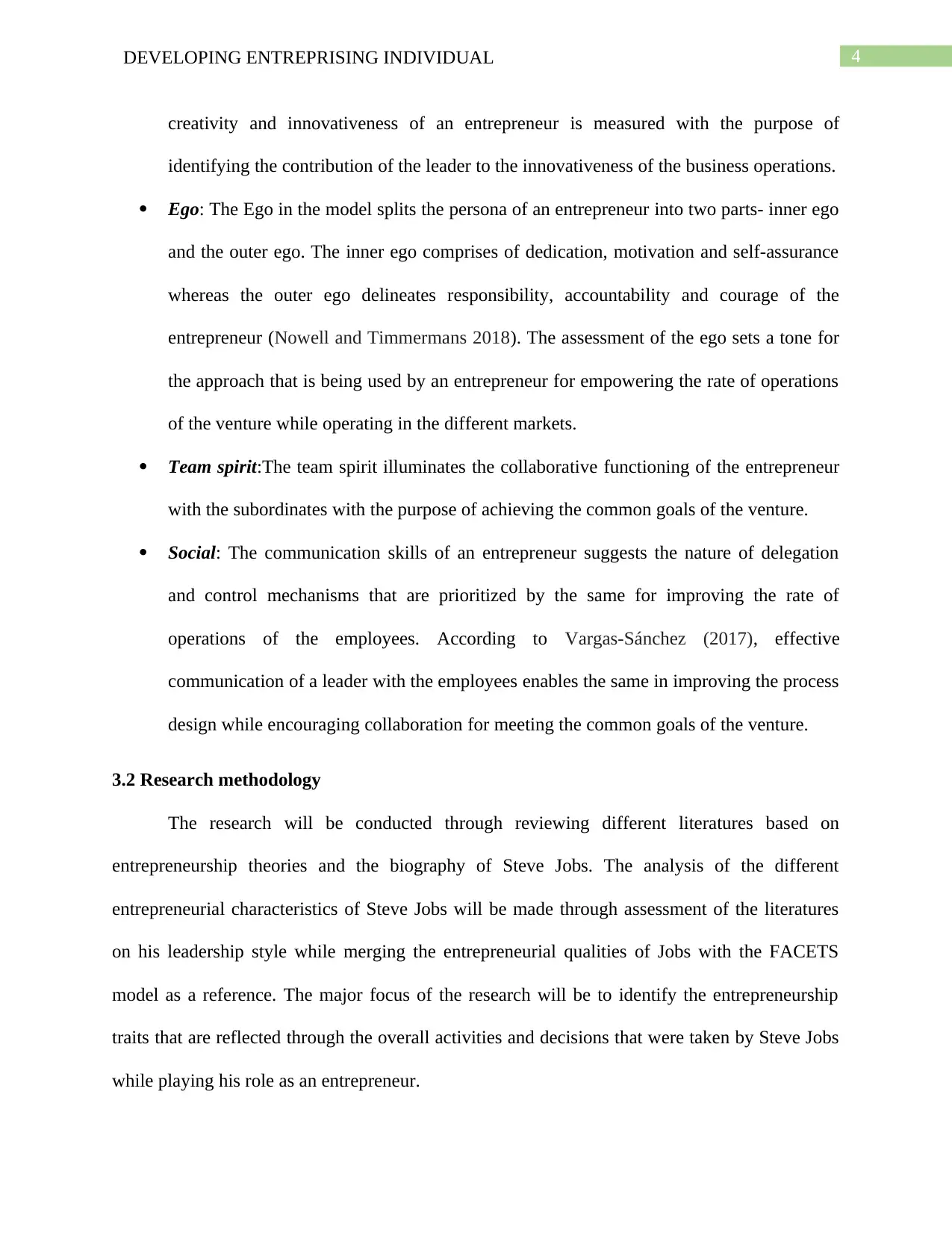
4DEVELOPING ENTREPRISING INDIVIDUAL
creativity and innovativeness of an entrepreneur is measured with the purpose of
identifying the contribution of the leader to the innovativeness of the business operations.
Ego: The Ego in the model splits the persona of an entrepreneur into two parts- inner ego
and the outer ego. The inner ego comprises of dedication, motivation and self-assurance
whereas the outer ego delineates responsibility, accountability and courage of the
entrepreneur (Nowell and Timmermans 2018). The assessment of the ego sets a tone for
the approach that is being used by an entrepreneur for empowering the rate of operations
of the venture while operating in the different markets.
Team spirit:The team spirit illuminates the collaborative functioning of the entrepreneur
with the subordinates with the purpose of achieving the common goals of the venture.
Social: The communication skills of an entrepreneur suggests the nature of delegation
and control mechanisms that are prioritized by the same for improving the rate of
operations of the employees. According to Vargas-Sánchez (2017), effective
communication of a leader with the employees enables the same in improving the process
design while encouraging collaboration for meeting the common goals of the venture.
3.2 Research methodology
The research will be conducted through reviewing different literatures based on
entrepreneurship theories and the biography of Steve Jobs. The analysis of the different
entrepreneurial characteristics of Steve Jobs will be made through assessment of the literatures
on his leadership style while merging the entrepreneurial qualities of Jobs with the FACETS
model as a reference. The major focus of the research will be to identify the entrepreneurship
traits that are reflected through the overall activities and decisions that were taken by Steve Jobs
while playing his role as an entrepreneur.
creativity and innovativeness of an entrepreneur is measured with the purpose of
identifying the contribution of the leader to the innovativeness of the business operations.
Ego: The Ego in the model splits the persona of an entrepreneur into two parts- inner ego
and the outer ego. The inner ego comprises of dedication, motivation and self-assurance
whereas the outer ego delineates responsibility, accountability and courage of the
entrepreneur (Nowell and Timmermans 2018). The assessment of the ego sets a tone for
the approach that is being used by an entrepreneur for empowering the rate of operations
of the venture while operating in the different markets.
Team spirit:The team spirit illuminates the collaborative functioning of the entrepreneur
with the subordinates with the purpose of achieving the common goals of the venture.
Social: The communication skills of an entrepreneur suggests the nature of delegation
and control mechanisms that are prioritized by the same for improving the rate of
operations of the employees. According to Vargas-Sánchez (2017), effective
communication of a leader with the employees enables the same in improving the process
design while encouraging collaboration for meeting the common goals of the venture.
3.2 Research methodology
The research will be conducted through reviewing different literatures based on
entrepreneurship theories and the biography of Steve Jobs. The analysis of the different
entrepreneurial characteristics of Steve Jobs will be made through assessment of the literatures
on his leadership style while merging the entrepreneurial qualities of Jobs with the FACETS
model as a reference. The major focus of the research will be to identify the entrepreneurship
traits that are reflected through the overall activities and decisions that were taken by Steve Jobs
while playing his role as an entrepreneur.
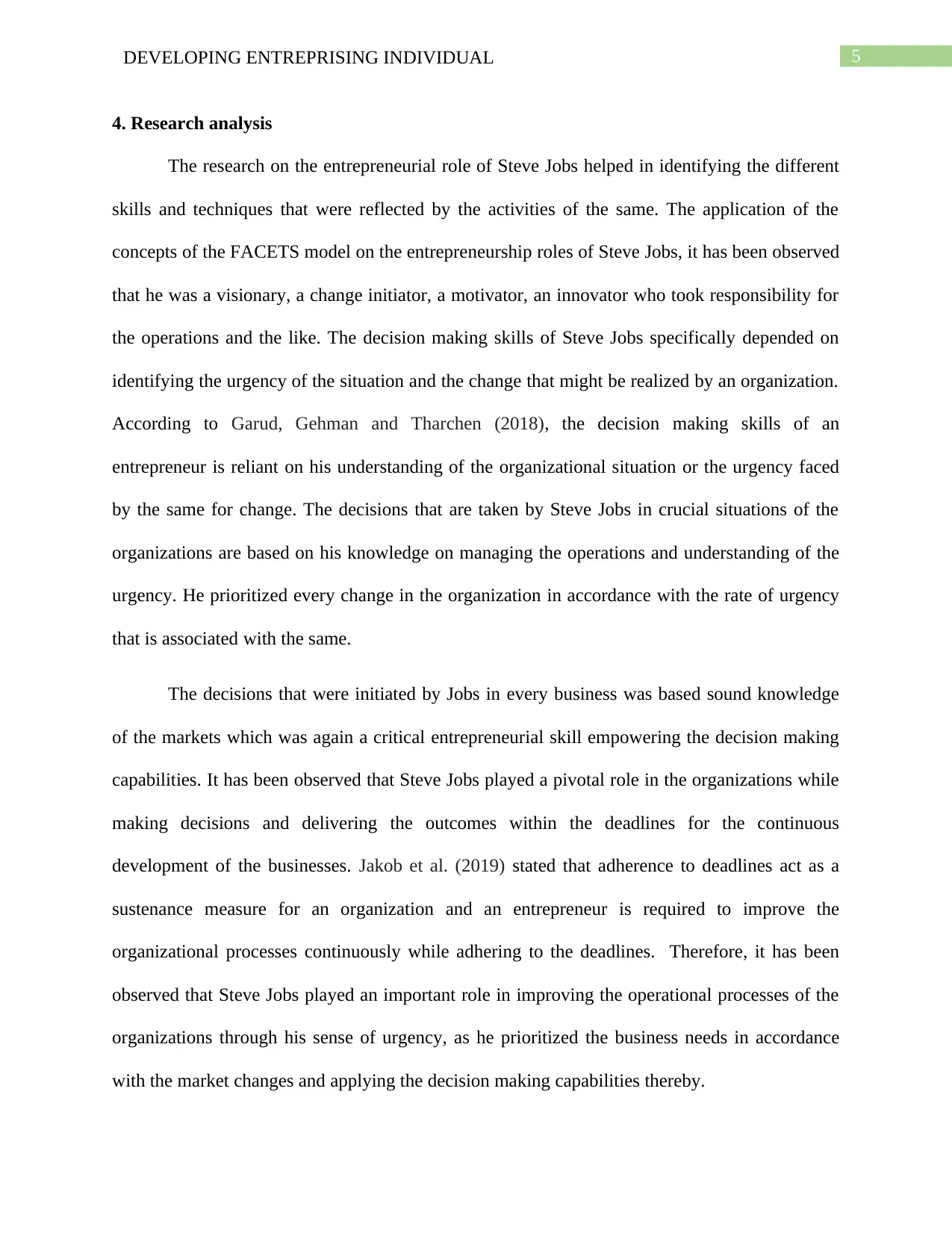
5DEVELOPING ENTREPRISING INDIVIDUAL
4. Research analysis
The research on the entrepreneurial role of Steve Jobs helped in identifying the different
skills and techniques that were reflected by the activities of the same. The application of the
concepts of the FACETS model on the entrepreneurship roles of Steve Jobs, it has been observed
that he was a visionary, a change initiator, a motivator, an innovator who took responsibility for
the operations and the like. The decision making skills of Steve Jobs specifically depended on
identifying the urgency of the situation and the change that might be realized by an organization.
According to Garud, Gehman and Tharchen (2018), the decision making skills of an
entrepreneur is reliant on his understanding of the organizational situation or the urgency faced
by the same for change. The decisions that are taken by Steve Jobs in crucial situations of the
organizations are based on his knowledge on managing the operations and understanding of the
urgency. He prioritized every change in the organization in accordance with the rate of urgency
that is associated with the same.
The decisions that were initiated by Jobs in every business was based sound knowledge
of the markets which was again a critical entrepreneurial skill empowering the decision making
capabilities. It has been observed that Steve Jobs played a pivotal role in the organizations while
making decisions and delivering the outcomes within the deadlines for the continuous
development of the businesses. Jakob et al. (2019) stated that adherence to deadlines act as a
sustenance measure for an organization and an entrepreneur is required to improve the
organizational processes continuously while adhering to the deadlines. Therefore, it has been
observed that Steve Jobs played an important role in improving the operational processes of the
organizations through his sense of urgency, as he prioritized the business needs in accordance
with the market changes and applying the decision making capabilities thereby.
4. Research analysis
The research on the entrepreneurial role of Steve Jobs helped in identifying the different
skills and techniques that were reflected by the activities of the same. The application of the
concepts of the FACETS model on the entrepreneurship roles of Steve Jobs, it has been observed
that he was a visionary, a change initiator, a motivator, an innovator who took responsibility for
the operations and the like. The decision making skills of Steve Jobs specifically depended on
identifying the urgency of the situation and the change that might be realized by an organization.
According to Garud, Gehman and Tharchen (2018), the decision making skills of an
entrepreneur is reliant on his understanding of the organizational situation or the urgency faced
by the same for change. The decisions that are taken by Steve Jobs in crucial situations of the
organizations are based on his knowledge on managing the operations and understanding of the
urgency. He prioritized every change in the organization in accordance with the rate of urgency
that is associated with the same.
The decisions that were initiated by Jobs in every business was based sound knowledge
of the markets which was again a critical entrepreneurial skill empowering the decision making
capabilities. It has been observed that Steve Jobs played a pivotal role in the organizations while
making decisions and delivering the outcomes within the deadlines for the continuous
development of the businesses. Jakob et al. (2019) stated that adherence to deadlines act as a
sustenance measure for an organization and an entrepreneur is required to improve the
organizational processes continuously while adhering to the deadlines. Therefore, it has been
observed that Steve Jobs played an important role in improving the operational processes of the
organizations through his sense of urgency, as he prioritized the business needs in accordance
with the market changes and applying the decision making capabilities thereby.
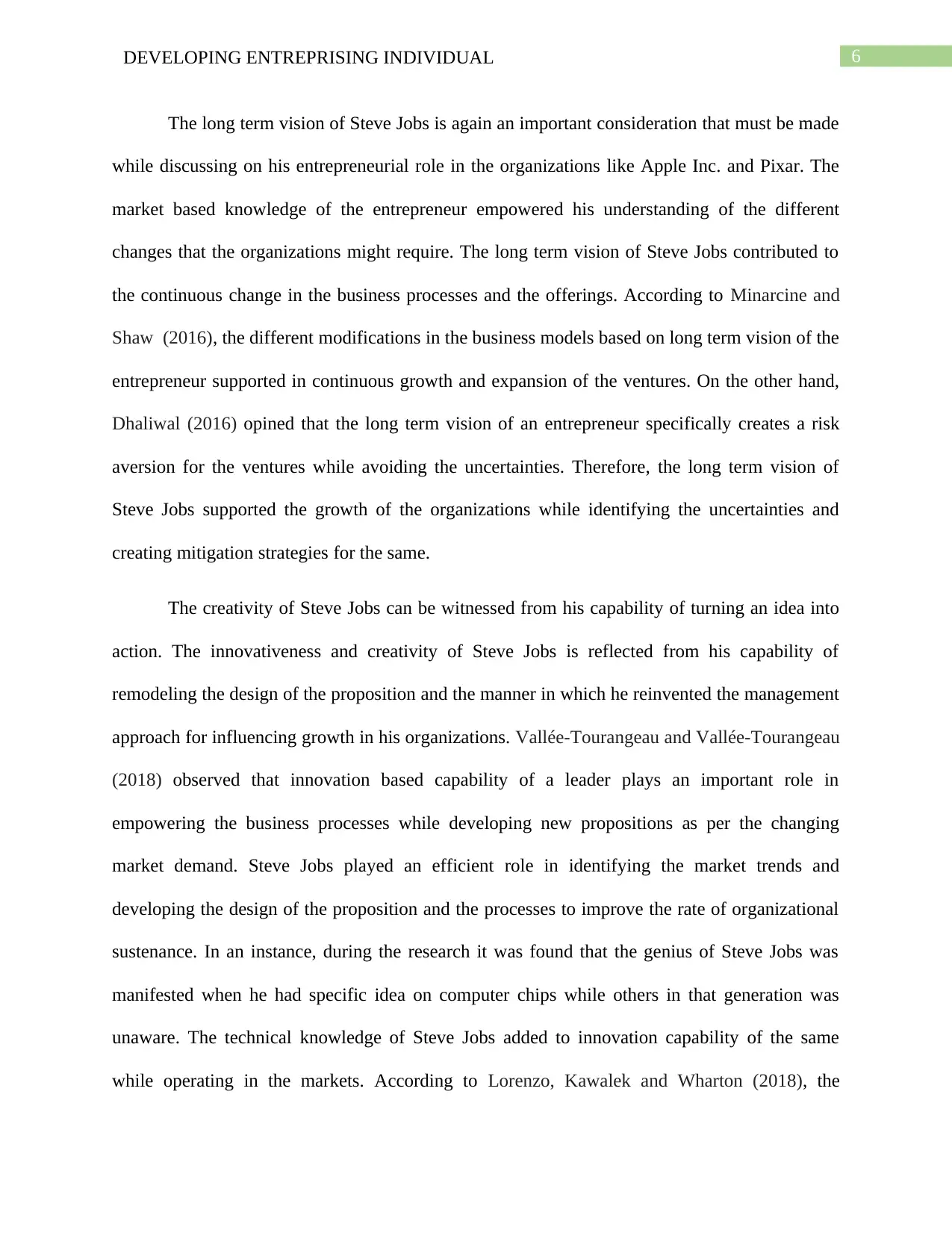
6DEVELOPING ENTREPRISING INDIVIDUAL
The long term vision of Steve Jobs is again an important consideration that must be made
while discussing on his entrepreneurial role in the organizations like Apple Inc. and Pixar. The
market based knowledge of the entrepreneur empowered his understanding of the different
changes that the organizations might require. The long term vision of Steve Jobs contributed to
the continuous change in the business processes and the offerings. According to Minarcine and
Shaw (2016), the different modifications in the business models based on long term vision of the
entrepreneur supported in continuous growth and expansion of the ventures. On the other hand,
Dhaliwal (2016) opined that the long term vision of an entrepreneur specifically creates a risk
aversion for the ventures while avoiding the uncertainties. Therefore, the long term vision of
Steve Jobs supported the growth of the organizations while identifying the uncertainties and
creating mitigation strategies for the same.
The creativity of Steve Jobs can be witnessed from his capability of turning an idea into
action. The innovativeness and creativity of Steve Jobs is reflected from his capability of
remodeling the design of the proposition and the manner in which he reinvented the management
approach for influencing growth in his organizations. Vallée-Tourangeau and Vallée-Tourangeau
(2018) observed that innovation based capability of a leader plays an important role in
empowering the business processes while developing new propositions as per the changing
market demand. Steve Jobs played an efficient role in identifying the market trends and
developing the design of the proposition and the processes to improve the rate of organizational
sustenance. In an instance, during the research it was found that the genius of Steve Jobs was
manifested when he had specific idea on computer chips while others in that generation was
unaware. The technical knowledge of Steve Jobs added to innovation capability of the same
while operating in the markets. According to Lorenzo, Kawalek and Wharton (2018), the
The long term vision of Steve Jobs is again an important consideration that must be made
while discussing on his entrepreneurial role in the organizations like Apple Inc. and Pixar. The
market based knowledge of the entrepreneur empowered his understanding of the different
changes that the organizations might require. The long term vision of Steve Jobs contributed to
the continuous change in the business processes and the offerings. According to Minarcine and
Shaw (2016), the different modifications in the business models based on long term vision of the
entrepreneur supported in continuous growth and expansion of the ventures. On the other hand,
Dhaliwal (2016) opined that the long term vision of an entrepreneur specifically creates a risk
aversion for the ventures while avoiding the uncertainties. Therefore, the long term vision of
Steve Jobs supported the growth of the organizations while identifying the uncertainties and
creating mitigation strategies for the same.
The creativity of Steve Jobs can be witnessed from his capability of turning an idea into
action. The innovativeness and creativity of Steve Jobs is reflected from his capability of
remodeling the design of the proposition and the manner in which he reinvented the management
approach for influencing growth in his organizations. Vallée-Tourangeau and Vallée-Tourangeau
(2018) observed that innovation based capability of a leader plays an important role in
empowering the business processes while developing new propositions as per the changing
market demand. Steve Jobs played an efficient role in identifying the market trends and
developing the design of the proposition and the processes to improve the rate of organizational
sustenance. In an instance, during the research it was found that the genius of Steve Jobs was
manifested when he had specific idea on computer chips while others in that generation was
unaware. The technical knowledge of Steve Jobs added to innovation capability of the same
while operating in the markets. According to Lorenzo, Kawalek and Wharton (2018), the
Paraphrase This Document
Need a fresh take? Get an instant paraphrase of this document with our AI Paraphraser
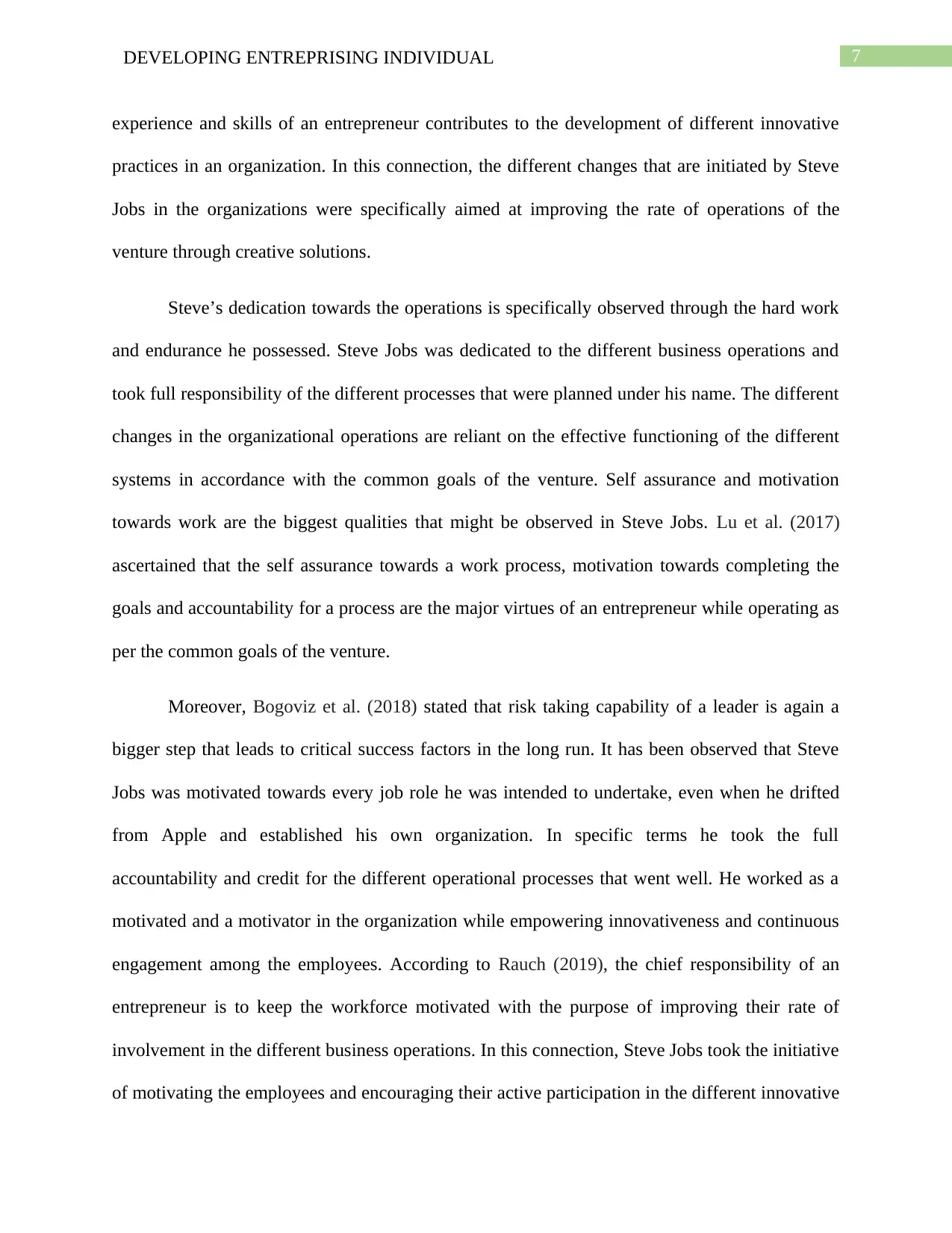
7DEVELOPING ENTREPRISING INDIVIDUAL
experience and skills of an entrepreneur contributes to the development of different innovative
practices in an organization. In this connection, the different changes that are initiated by Steve
Jobs in the organizations were specifically aimed at improving the rate of operations of the
venture through creative solutions.
Steve’s dedication towards the operations is specifically observed through the hard work
and endurance he possessed. Steve Jobs was dedicated to the different business operations and
took full responsibility of the different processes that were planned under his name. The different
changes in the organizational operations are reliant on the effective functioning of the different
systems in accordance with the common goals of the venture. Self assurance and motivation
towards work are the biggest qualities that might be observed in Steve Jobs. Lu et al. (2017)
ascertained that the self assurance towards a work process, motivation towards completing the
goals and accountability for a process are the major virtues of an entrepreneur while operating as
per the common goals of the venture.
Moreover, Bogoviz et al. (2018) stated that risk taking capability of a leader is again a
bigger step that leads to critical success factors in the long run. It has been observed that Steve
Jobs was motivated towards every job role he was intended to undertake, even when he drifted
from Apple and established his own organization. In specific terms he took the full
accountability and credit for the different operational processes that went well. He worked as a
motivated and a motivator in the organization while empowering innovativeness and continuous
engagement among the employees. According to Rauch (2019), the chief responsibility of an
entrepreneur is to keep the workforce motivated with the purpose of improving their rate of
involvement in the different business operations. In this connection, Steve Jobs took the initiative
of motivating the employees and encouraging their active participation in the different innovative
experience and skills of an entrepreneur contributes to the development of different innovative
practices in an organization. In this connection, the different changes that are initiated by Steve
Jobs in the organizations were specifically aimed at improving the rate of operations of the
venture through creative solutions.
Steve’s dedication towards the operations is specifically observed through the hard work
and endurance he possessed. Steve Jobs was dedicated to the different business operations and
took full responsibility of the different processes that were planned under his name. The different
changes in the organizational operations are reliant on the effective functioning of the different
systems in accordance with the common goals of the venture. Self assurance and motivation
towards work are the biggest qualities that might be observed in Steve Jobs. Lu et al. (2017)
ascertained that the self assurance towards a work process, motivation towards completing the
goals and accountability for a process are the major virtues of an entrepreneur while operating as
per the common goals of the venture.
Moreover, Bogoviz et al. (2018) stated that risk taking capability of a leader is again a
bigger step that leads to critical success factors in the long run. It has been observed that Steve
Jobs was motivated towards every job role he was intended to undertake, even when he drifted
from Apple and established his own organization. In specific terms he took the full
accountability and credit for the different operational processes that went well. He worked as a
motivated and a motivator in the organization while empowering innovativeness and continuous
engagement among the employees. According to Rauch (2019), the chief responsibility of an
entrepreneur is to keep the workforce motivated with the purpose of improving their rate of
involvement in the different business operations. In this connection, Steve Jobs took the initiative
of motivating the employees and encouraging their active participation in the different innovative
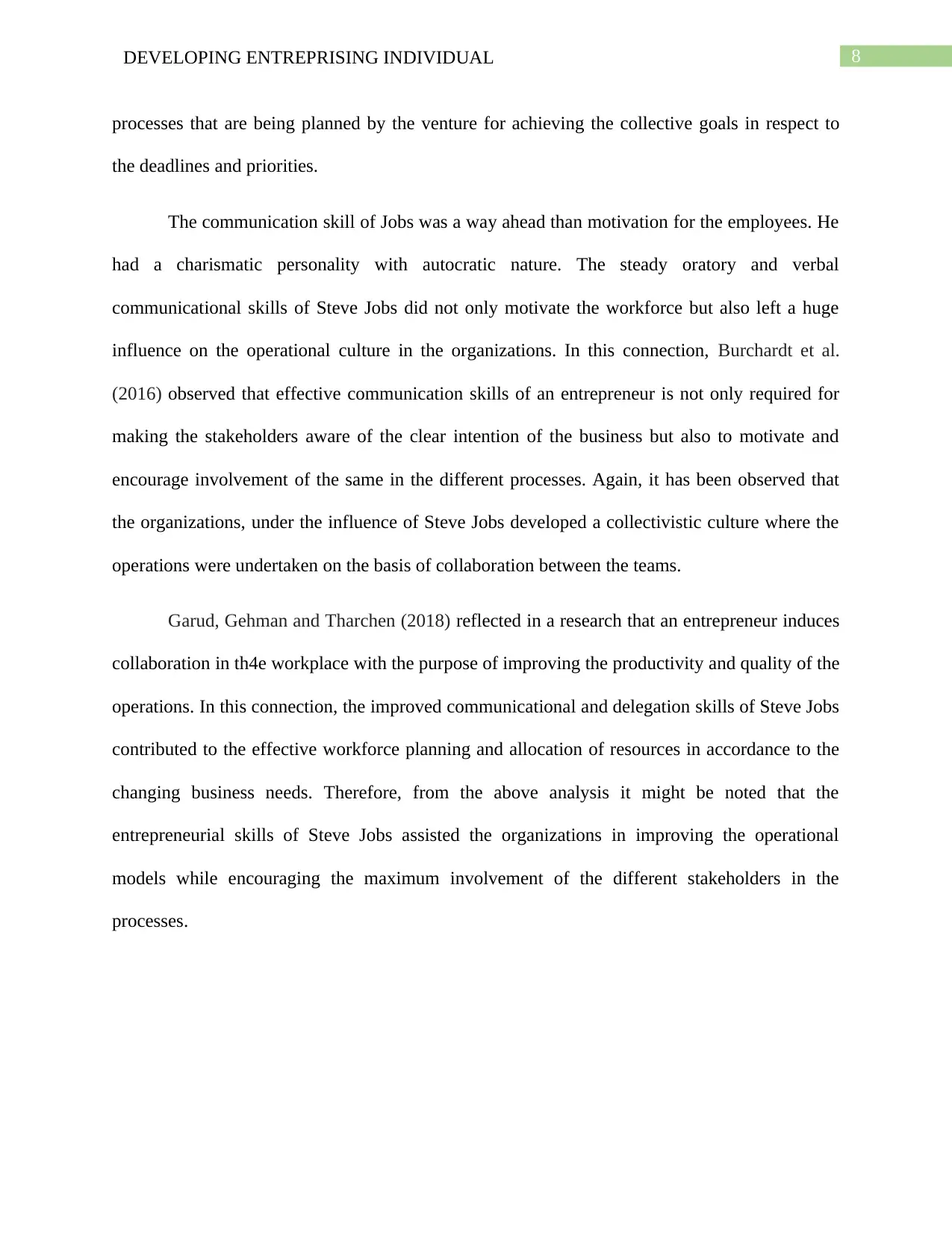
8DEVELOPING ENTREPRISING INDIVIDUAL
processes that are being planned by the venture for achieving the collective goals in respect to
the deadlines and priorities.
The communication skill of Jobs was a way ahead than motivation for the employees. He
had a charismatic personality with autocratic nature. The steady oratory and verbal
communicational skills of Steve Jobs did not only motivate the workforce but also left a huge
influence on the operational culture in the organizations. In this connection, Burchardt et al.
(2016) observed that effective communication skills of an entrepreneur is not only required for
making the stakeholders aware of the clear intention of the business but also to motivate and
encourage involvement of the same in the different processes. Again, it has been observed that
the organizations, under the influence of Steve Jobs developed a collectivistic culture where the
operations were undertaken on the basis of collaboration between the teams.
Garud, Gehman and Tharchen (2018) reflected in a research that an entrepreneur induces
collaboration in th4e workplace with the purpose of improving the productivity and quality of the
operations. In this connection, the improved communicational and delegation skills of Steve Jobs
contributed to the effective workforce planning and allocation of resources in accordance to the
changing business needs. Therefore, from the above analysis it might be noted that the
entrepreneurial skills of Steve Jobs assisted the organizations in improving the operational
models while encouraging the maximum involvement of the different stakeholders in the
processes.
processes that are being planned by the venture for achieving the collective goals in respect to
the deadlines and priorities.
The communication skill of Jobs was a way ahead than motivation for the employees. He
had a charismatic personality with autocratic nature. The steady oratory and verbal
communicational skills of Steve Jobs did not only motivate the workforce but also left a huge
influence on the operational culture in the organizations. In this connection, Burchardt et al.
(2016) observed that effective communication skills of an entrepreneur is not only required for
making the stakeholders aware of the clear intention of the business but also to motivate and
encourage involvement of the same in the different processes. Again, it has been observed that
the organizations, under the influence of Steve Jobs developed a collectivistic culture where the
operations were undertaken on the basis of collaboration between the teams.
Garud, Gehman and Tharchen (2018) reflected in a research that an entrepreneur induces
collaboration in th4e workplace with the purpose of improving the productivity and quality of the
operations. In this connection, the improved communicational and delegation skills of Steve Jobs
contributed to the effective workforce planning and allocation of resources in accordance to the
changing business needs. Therefore, from the above analysis it might be noted that the
entrepreneurial skills of Steve Jobs assisted the organizations in improving the operational
models while encouraging the maximum involvement of the different stakeholders in the
processes.
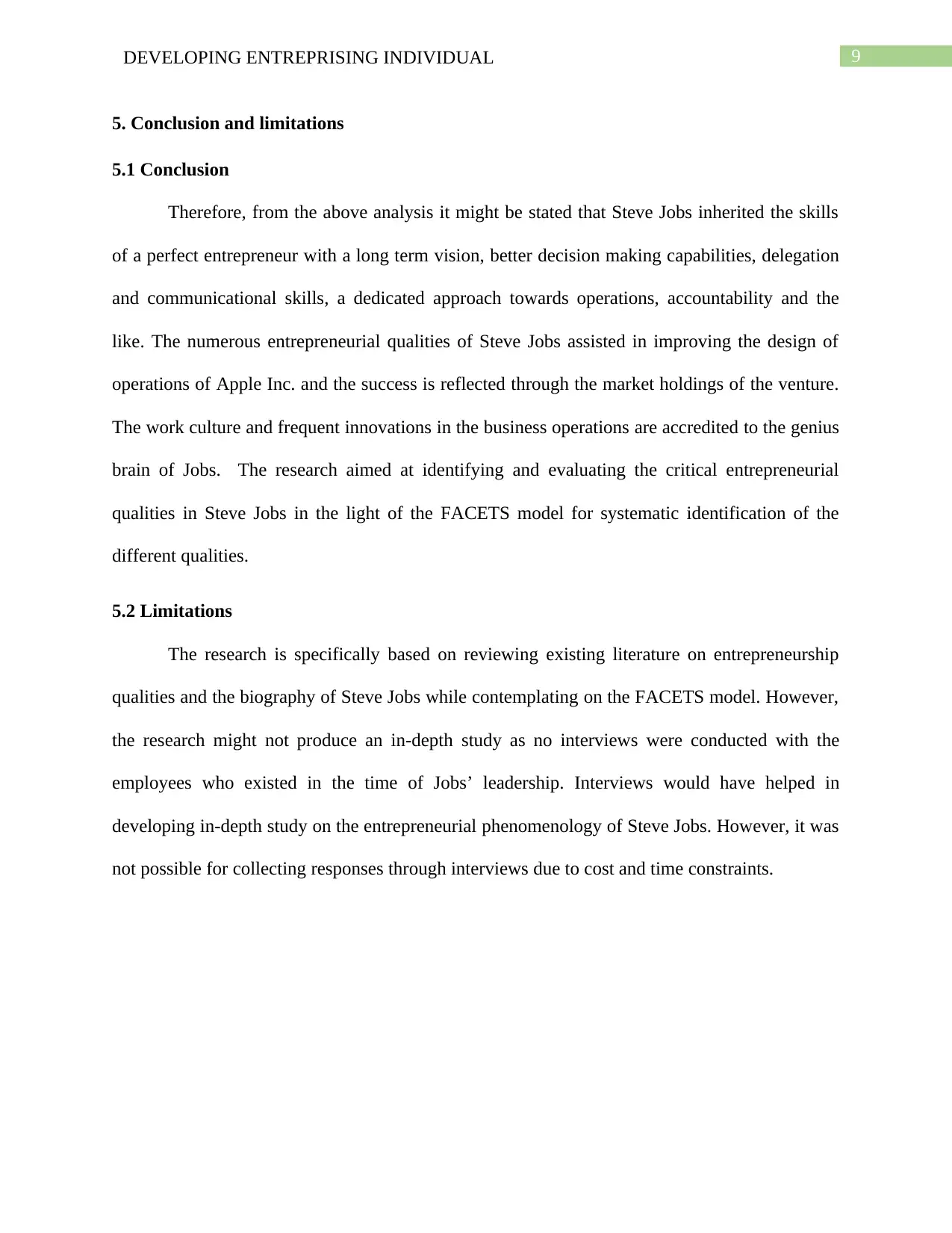
9DEVELOPING ENTREPRISING INDIVIDUAL
5. Conclusion and limitations
5.1 Conclusion
Therefore, from the above analysis it might be stated that Steve Jobs inherited the skills
of a perfect entrepreneur with a long term vision, better decision making capabilities, delegation
and communicational skills, a dedicated approach towards operations, accountability and the
like. The numerous entrepreneurial qualities of Steve Jobs assisted in improving the design of
operations of Apple Inc. and the success is reflected through the market holdings of the venture.
The work culture and frequent innovations in the business operations are accredited to the genius
brain of Jobs. The research aimed at identifying and evaluating the critical entrepreneurial
qualities in Steve Jobs in the light of the FACETS model for systematic identification of the
different qualities.
5.2 Limitations
The research is specifically based on reviewing existing literature on entrepreneurship
qualities and the biography of Steve Jobs while contemplating on the FACETS model. However,
the research might not produce an in-depth study as no interviews were conducted with the
employees who existed in the time of Jobs’ leadership. Interviews would have helped in
developing in-depth study on the entrepreneurial phenomenology of Steve Jobs. However, it was
not possible for collecting responses through interviews due to cost and time constraints.
5. Conclusion and limitations
5.1 Conclusion
Therefore, from the above analysis it might be stated that Steve Jobs inherited the skills
of a perfect entrepreneur with a long term vision, better decision making capabilities, delegation
and communicational skills, a dedicated approach towards operations, accountability and the
like. The numerous entrepreneurial qualities of Steve Jobs assisted in improving the design of
operations of Apple Inc. and the success is reflected through the market holdings of the venture.
The work culture and frequent innovations in the business operations are accredited to the genius
brain of Jobs. The research aimed at identifying and evaluating the critical entrepreneurial
qualities in Steve Jobs in the light of the FACETS model for systematic identification of the
different qualities.
5.2 Limitations
The research is specifically based on reviewing existing literature on entrepreneurship
qualities and the biography of Steve Jobs while contemplating on the FACETS model. However,
the research might not produce an in-depth study as no interviews were conducted with the
employees who existed in the time of Jobs’ leadership. Interviews would have helped in
developing in-depth study on the entrepreneurial phenomenology of Steve Jobs. However, it was
not possible for collecting responses through interviews due to cost and time constraints.
Secure Best Marks with AI Grader
Need help grading? Try our AI Grader for instant feedback on your assignments.
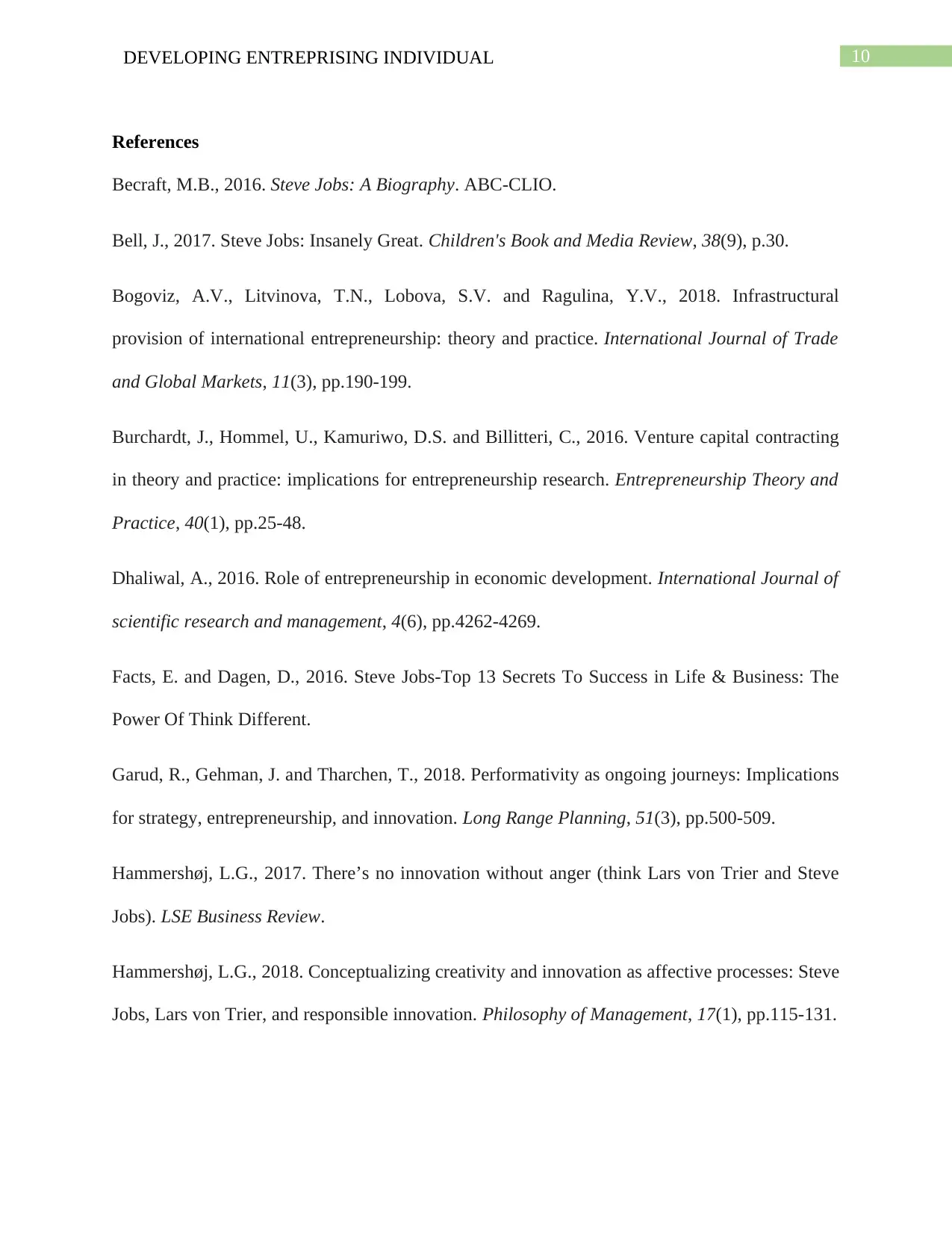
10DEVELOPING ENTREPRISING INDIVIDUAL
References
Becraft, M.B., 2016. Steve Jobs: A Biography. ABC-CLIO.
Bell, J., 2017. Steve Jobs: Insanely Great. Children's Book and Media Review, 38(9), p.30.
Bogoviz, A.V., Litvinova, T.N., Lobova, S.V. and Ragulina, Y.V., 2018. Infrastructural
provision of international entrepreneurship: theory and practice. International Journal of Trade
and Global Markets, 11(3), pp.190-199.
Burchardt, J., Hommel, U., Kamuriwo, D.S. and Billitteri, C., 2016. Venture capital contracting
in theory and practice: implications for entrepreneurship research. Entrepreneurship Theory and
Practice, 40(1), pp.25-48.
Dhaliwal, A., 2016. Role of entrepreneurship in economic development. International Journal of
scientific research and management, 4(6), pp.4262-4269.
Facts, E. and Dagen, D., 2016. Steve Jobs-Top 13 Secrets To Success in Life & Business: The
Power Of Think Different.
Garud, R., Gehman, J. and Tharchen, T., 2018. Performativity as ongoing journeys: Implications
for strategy, entrepreneurship, and innovation. Long Range Planning, 51(3), pp.500-509.
Hammershøj, L.G., 2017. There’s no innovation without anger (think Lars von Trier and Steve
Jobs). LSE Business Review.
Hammershøj, L.G., 2018. Conceptualizing creativity and innovation as affective processes: Steve
Jobs, Lars von Trier, and responsible innovation. Philosophy of Management, 17(1), pp.115-131.
References
Becraft, M.B., 2016. Steve Jobs: A Biography. ABC-CLIO.
Bell, J., 2017. Steve Jobs: Insanely Great. Children's Book and Media Review, 38(9), p.30.
Bogoviz, A.V., Litvinova, T.N., Lobova, S.V. and Ragulina, Y.V., 2018. Infrastructural
provision of international entrepreneurship: theory and practice. International Journal of Trade
and Global Markets, 11(3), pp.190-199.
Burchardt, J., Hommel, U., Kamuriwo, D.S. and Billitteri, C., 2016. Venture capital contracting
in theory and practice: implications for entrepreneurship research. Entrepreneurship Theory and
Practice, 40(1), pp.25-48.
Dhaliwal, A., 2016. Role of entrepreneurship in economic development. International Journal of
scientific research and management, 4(6), pp.4262-4269.
Facts, E. and Dagen, D., 2016. Steve Jobs-Top 13 Secrets To Success in Life & Business: The
Power Of Think Different.
Garud, R., Gehman, J. and Tharchen, T., 2018. Performativity as ongoing journeys: Implications
for strategy, entrepreneurship, and innovation. Long Range Planning, 51(3), pp.500-509.
Hammershøj, L.G., 2017. There’s no innovation without anger (think Lars von Trier and Steve
Jobs). LSE Business Review.
Hammershøj, L.G., 2018. Conceptualizing creativity and innovation as affective processes: Steve
Jobs, Lars von Trier, and responsible innovation. Philosophy of Management, 17(1), pp.115-131.
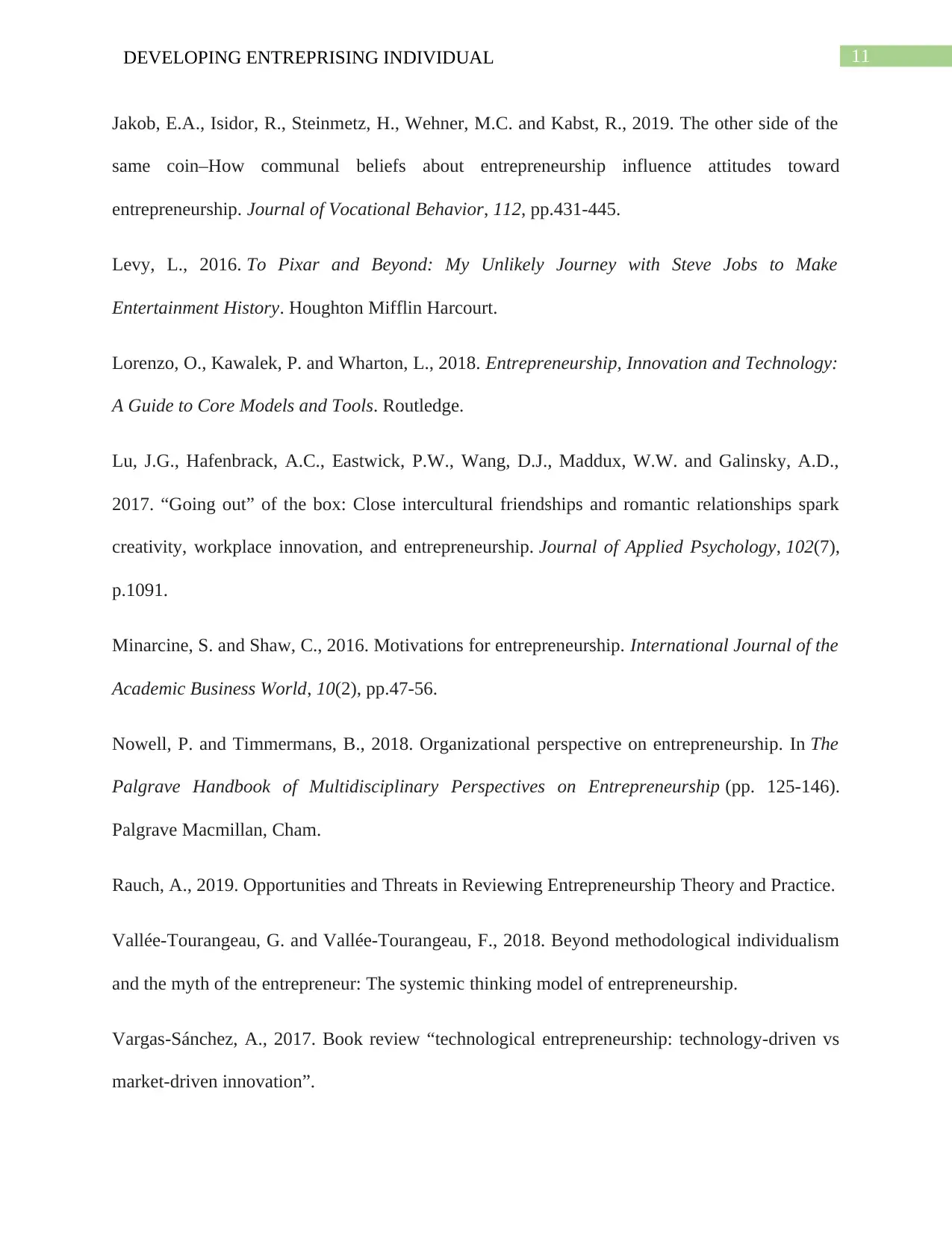
11DEVELOPING ENTREPRISING INDIVIDUAL
Jakob, E.A., Isidor, R., Steinmetz, H., Wehner, M.C. and Kabst, R., 2019. The other side of the
same coin–How communal beliefs about entrepreneurship influence attitudes toward
entrepreneurship. Journal of Vocational Behavior, 112, pp.431-445.
Levy, L., 2016. To Pixar and Beyond: My Unlikely Journey with Steve Jobs to Make
Entertainment History. Houghton Mifflin Harcourt.
Lorenzo, O., Kawalek, P. and Wharton, L., 2018. Entrepreneurship, Innovation and Technology:
A Guide to Core Models and Tools. Routledge.
Lu, J.G., Hafenbrack, A.C., Eastwick, P.W., Wang, D.J., Maddux, W.W. and Galinsky, A.D.,
2017. “Going out” of the box: Close intercultural friendships and romantic relationships spark
creativity, workplace innovation, and entrepreneurship. Journal of Applied Psychology, 102(7),
p.1091.
Minarcine, S. and Shaw, C., 2016. Motivations for entrepreneurship. International Journal of the
Academic Business World, 10(2), pp.47-56.
Nowell, P. and Timmermans, B., 2018. Organizational perspective on entrepreneurship. In The
Palgrave Handbook of Multidisciplinary Perspectives on Entrepreneurship (pp. 125-146).
Palgrave Macmillan, Cham.
Rauch, A., 2019. Opportunities and Threats in Reviewing Entrepreneurship Theory and Practice.
Vallée-Tourangeau, G. and Vallée-Tourangeau, F., 2018. Beyond methodological individualism
and the myth of the entrepreneur: The systemic thinking model of entrepreneurship.
Vargas-Sánchez, A., 2017. Book review “technological entrepreneurship: technology-driven vs
market-driven innovation”.
Jakob, E.A., Isidor, R., Steinmetz, H., Wehner, M.C. and Kabst, R., 2019. The other side of the
same coin–How communal beliefs about entrepreneurship influence attitudes toward
entrepreneurship. Journal of Vocational Behavior, 112, pp.431-445.
Levy, L., 2016. To Pixar and Beyond: My Unlikely Journey with Steve Jobs to Make
Entertainment History. Houghton Mifflin Harcourt.
Lorenzo, O., Kawalek, P. and Wharton, L., 2018. Entrepreneurship, Innovation and Technology:
A Guide to Core Models and Tools. Routledge.
Lu, J.G., Hafenbrack, A.C., Eastwick, P.W., Wang, D.J., Maddux, W.W. and Galinsky, A.D.,
2017. “Going out” of the box: Close intercultural friendships and romantic relationships spark
creativity, workplace innovation, and entrepreneurship. Journal of Applied Psychology, 102(7),
p.1091.
Minarcine, S. and Shaw, C., 2016. Motivations for entrepreneurship. International Journal of the
Academic Business World, 10(2), pp.47-56.
Nowell, P. and Timmermans, B., 2018. Organizational perspective on entrepreneurship. In The
Palgrave Handbook of Multidisciplinary Perspectives on Entrepreneurship (pp. 125-146).
Palgrave Macmillan, Cham.
Rauch, A., 2019. Opportunities and Threats in Reviewing Entrepreneurship Theory and Practice.
Vallée-Tourangeau, G. and Vallée-Tourangeau, F., 2018. Beyond methodological individualism
and the myth of the entrepreneur: The systemic thinking model of entrepreneurship.
Vargas-Sánchez, A., 2017. Book review “technological entrepreneurship: technology-driven vs
market-driven innovation”.

12DEVELOPING ENTREPRISING INDIVIDUAL
Yang, X. and Andersson, D.E., 2018. Spatial aspects of entrepreneurship and innovation. The
Annals of Regional Science, 61(3), pp.457-462.
Yun, J.J., Jung, K. and Yigitcanlar, T., 2018. Open innovation of James watt and Steve jobs:
Insights for sustainability of economic growth.
Yang, X. and Andersson, D.E., 2018. Spatial aspects of entrepreneurship and innovation. The
Annals of Regional Science, 61(3), pp.457-462.
Yun, J.J., Jung, K. and Yigitcanlar, T., 2018. Open innovation of James watt and Steve jobs:
Insights for sustainability of economic growth.
1 out of 13
Related Documents
Your All-in-One AI-Powered Toolkit for Academic Success.
+13062052269
info@desklib.com
Available 24*7 on WhatsApp / Email
![[object Object]](/_next/static/media/star-bottom.7253800d.svg)
Unlock your academic potential
© 2024 | Zucol Services PVT LTD | All rights reserved.





